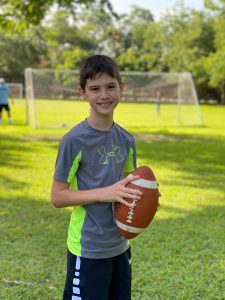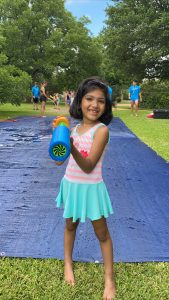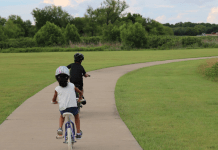This post has been sponsored by Cooper Fitness to bring you this experience.
Capture the flag, swimming, arts and crafts, and sports are all camp activities that come to mind when your children reflect on the summer days spent at camp. These activities provided an enjoyable and memorable summer for your child, but the reach of camp goes well beyond fun, and camp experiences can result in numerous psychological benefits which help lay the groundwork for positive social interactions.
Camp is the ultimate mark of the end of the academic school year. Camp is often an ideal partner to school activities, developing social and emotional skills, building character, and teaching independence in children leading to success in the classroom. The life lessons and virtues experienced in summer camp are invaluable and will stay with your child and frame future interactions.
Traits fostered at summer camp that ultimately enrich the classroom experience include self-confidence, empathy, and integrity.
 Self-confidence: The school year can present many trials and tribulations, ultimately testing your child’s confidence. Social dynamics, academic performance, family expectations, and a bevy of other issues may surface and could potentially undermine your child’s self-confidence. By learning to be more accepting, children can build a strong foundation to weather these storms. Whether it is the game they won as their fellow campers cheered them on to victory or the camper of the week accolade they earned, summer camp allows your child the opportunity to explore a sense of self. This confidence can enrich learning experiences in the classroom, including the feeling of empowerment to participate in the discussion or ask a question to further understand a concept being taught. In a survey of campers at American Camp Association (ACA) accredited camps in the summer of 2000, participants credited camp with helping them feel more confident in school, excited to be in class, wanting to know more, and meet challenges with a different approach, rather than giving up. A heightened sense of self-confidence can ultimately lead to increased levels of engagement in the classroom ultimately maximizing the lessons they are taught inside and outside the classroom.
Self-confidence: The school year can present many trials and tribulations, ultimately testing your child’s confidence. Social dynamics, academic performance, family expectations, and a bevy of other issues may surface and could potentially undermine your child’s self-confidence. By learning to be more accepting, children can build a strong foundation to weather these storms. Whether it is the game they won as their fellow campers cheered them on to victory or the camper of the week accolade they earned, summer camp allows your child the opportunity to explore a sense of self. This confidence can enrich learning experiences in the classroom, including the feeling of empowerment to participate in the discussion or ask a question to further understand a concept being taught. In a survey of campers at American Camp Association (ACA) accredited camps in the summer of 2000, participants credited camp with helping them feel more confident in school, excited to be in class, wanting to know more, and meet challenges with a different approach, rather than giving up. A heightened sense of self-confidence can ultimately lead to increased levels of engagement in the classroom ultimately maximizing the lessons they are taught inside and outside the classroom.- Empathy: Empathy involves thoughts and feelings that arise when we attempt to relate to the feelings of another person. Empathy goes beyond just acknowledging the feelings of others; care and valuation of these feelings are the true basis of empathy. As humans, we possess a natural inclination to express empathy to those similar to ourselves. In summer camp, your child likely interacted with children from all walks of life, with different backgrounds and beliefs. Having this opportunity to spend time with a diverse group of campers encourages your child to think beyond themselves and what they’ve known growing up, and to open their eyes, ears (and most importantly hearts) to all types of people. Campers from 20 ACA accredited summer camps surveyed reported that camp taught them how to relate to people on a level deeper than that of school or everyday life, how to interact with different kinds of people, and cooperate well with others who may not share your same opinions. In a school setting where a sense of community is being fostered and cultivated, having the chance to meet people from varied backgrounds at camp brings forth the opportunity to practice empathy.
 Integrity: Most of us have heard the quote “integrity is doing the right thing, even when no one is looking.” In both camp and classroom settings, times will exist when your child needs to rely on self-regulation to go about a task or situation where a person of authority is not present. One key aspect of developing integrity is through accountability, which is afforded to campers in various aspects of camp. Part of a child’s development is to be entrusted with unique responsibilities at camp and they are expected and relied upon to perform. This could be something as simple as helping a counselor clean up after an activity, being the “leader” of their team in a game, helping greet other campers at drop-off, or holding the door for other campers. When given a responsibility, your child is also given the opportunity to understand why it’s important. Allowing your child to explore responsibilities at camp can lead to a better understanding, which can develop repeatable behaviors, even if a counselor or teacher isn’t present. These behaviors help support developing self-regulation for your child, which is incredibly important in the classroom. Completing assignments both in and out of the classroom becomes much easier for the child when they learn to self-regulate and complete tasks without the presence of authority.
Integrity: Most of us have heard the quote “integrity is doing the right thing, even when no one is looking.” In both camp and classroom settings, times will exist when your child needs to rely on self-regulation to go about a task or situation where a person of authority is not present. One key aspect of developing integrity is through accountability, which is afforded to campers in various aspects of camp. Part of a child’s development is to be entrusted with unique responsibilities at camp and they are expected and relied upon to perform. This could be something as simple as helping a counselor clean up after an activity, being the “leader” of their team in a game, helping greet other campers at drop-off, or holding the door for other campers. When given a responsibility, your child is also given the opportunity to understand why it’s important. Allowing your child to explore responsibilities at camp can lead to a better understanding, which can develop repeatable behaviors, even if a counselor or teacher isn’t present. These behaviors help support developing self-regulation for your child, which is incredibly important in the classroom. Completing assignments both in and out of the classroom becomes much easier for the child when they learn to self-regulate and complete tasks without the presence of authority.
A camp setting can also support or help develop many other traits which carry over into the school year, in addition to self-confidence, empathy, and integrity. Explore the possibilities of building on these traits by registering your child for a unique experience in fall camps at Cooper Fitness Center to continue the fun (and development) throughout the school year. Visit cooperyouth.com/Dallas for fall and winter break camp offerings, football and tennis clinics, triathlon training, Beautiful Fit Academy, and more.
 Gavin Raley is the Programs Manager at Cooper Fitness Center. Gavin studied Kinesiology and Exercise Science at The University of Texas at Arlington and plays an integral role in the Cooper Youth Programs.
Gavin Raley is the Programs Manager at Cooper Fitness Center. Gavin studied Kinesiology and Exercise Science at The University of Texas at Arlington and plays an integral role in the Cooper Youth Programs.
Cooper Fitness Center has offered youth programs for more than 25 years and features a variety of year-round fitness programs, youth events, and sports training for kids, including boxing, martial arts, swimming, tennis, soccer, summer camp, and other seasonal offerings.













